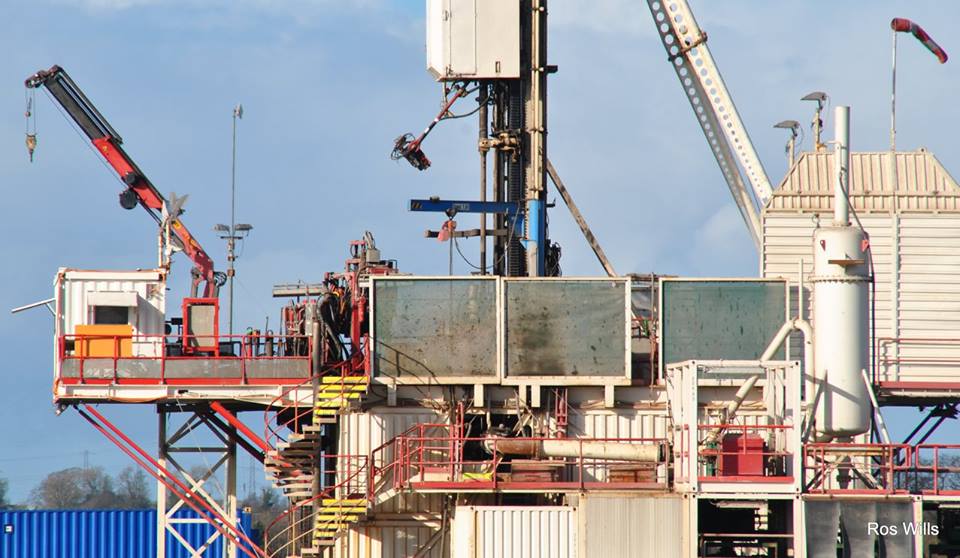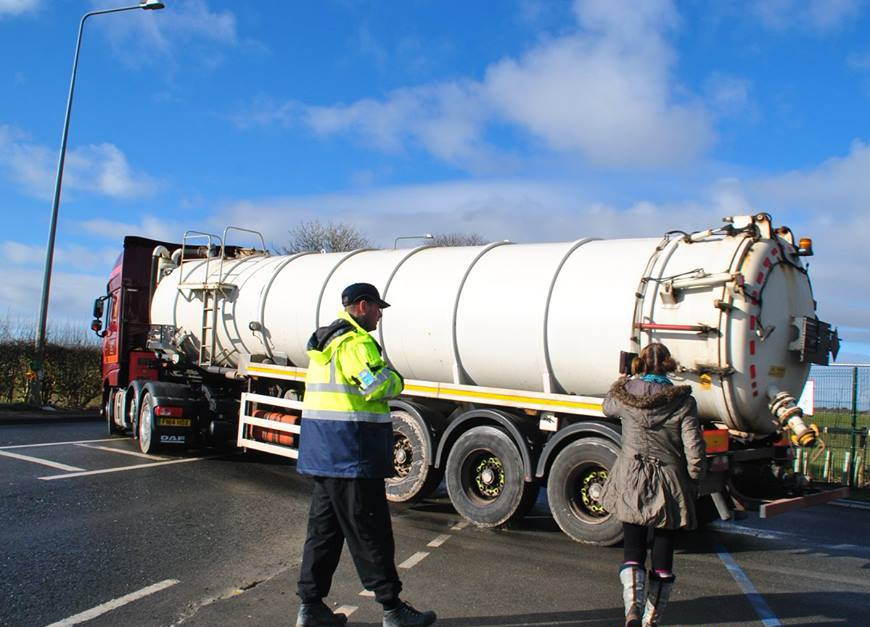
Cuadrilla’s Preston New Road shale gas site near Blackpool, 17 February 2018. Photo: Ros Wills
The Environment Agency spelt out today what it sees as the risks to water from a shale gas industry.
In its report The State of the environment: water quality, the organisation included fracking as a potential threat.
The process was considered as a future pressure, alongside nano-particles, plastic pollution, particular chemicals of concern, population growth and climate change.
The report, introduced by the Environment Agency’s chair, Emma Howard Boyd, said:
“Fracking for shale gas could bring risks to the quality of both surface and groundwaters as well as placing a new demand on water resources in some areas.
“The main concerns involve accidental spills or leaks, particularly if these should occur in the subsurface.”

Tanker leaving Cuadrilla’s shale gas site at Preston New Road, near Blackpool, 17 February 2018. Photo: Ros Wills
Last week, researchers at Durham and Newcastle Universities warned that there could be one spill for every four large UK shale gas pads. The study, the first of its kind in the UK, concluded that strict controls would be “a necessity” to minimise the risk of spills on site and during transport of chemicals.
This message was repeated in today’s Environment Agency report which said:
“Strong regulation around techniques such as fracking will need to continue in order to minimise such risks.”
The report referenced the 2012 Shale gas extraction in the UK: a review of hydraulic fracturing by the Royal Society and Royal Academy of Engineering.
This recommended that a single body should take the lead on regulation of a UK fracking industry – something which has yet to happen.
Other recommendations included:
- Minimising the use of water
- Recycling and reuse of waste water
- Planning from the outset the disposal of waste fluids
- Developing arrangements for monitoring abandoned wells
- Clarifying guidelines to ensure the independence of well examiners from the site operator
Reaction
Ken Cronin, Chief Executive of the industry body, UK Onshore Oil and Gas, said:
“It is only right that the Environment Agency understands any potential risks to the water and wider environment associated with industrial activities of all kinds. It is its role as a regulator to both understand potential risks and ensure measures are in place, through permitting, to provide the necessary protections.
The onshore industry is fully committed to working transparently on environmental issues and continues to engage openly to ensure our excellent environmental record is maintained.”
The Green Party MEP, Keith Taylor, who campaigns against fracking and onshore oil and gas developments, said:
“The Environment Agency has only confirmed what we already know; fracking is a major threat to our water supply. The report also reveals the Government is already failing to clean up its shamefully poor record on water quality. That 86% of water bodies fail to reach ‘good’ ecological status is a sad indictment of the Conservative Government’s dereliction of its duty to protect our environment and our health.
“To put our water further at risk with an ideologically driven crusade to fast-track fracking across England is brazen ecological sabotage–not to mention a dangerous form of climate denial.”
Updated: 20/2/2018 with quote from Ken Cronin
Categories: Regulation

“Water quality and resources could be at risk from fracking, says the Environment Agency” but we don’t need a spill or leak for this to happen, as EVERY frack produces millions of litres of extremely salty, toxic & radioactive flow-back waste that WILL pollute our environment irrespective of the ‘treatment’ it is subjected to, as there will ALWAYS be a toxic & radioactive residue that won’t just disappear. ☹️
Well said Wandering Dutchman.
I find it incredible that this Report should highlight the risk from hydraulic fracturing while ignoring risks from “green” energy sources such as “anaerobic digestion” which have caused a number of toxic discharges over the years and damage to water courses. It feels like the Environment Agency’s experts are just as subject to subjective bias as the rest of us.
Not sure why WD should assume that the pumped frack fluid should not be adequately cleaned to standards that should enable it to be returned to the environment safely. That process will be governed by regulation.
By the way the BBC is forecasting a cold spell lasting into early March with low wind speeds across Europe. It’s worth looking at sites like Gridwatch. Gridwatch gives direct access to National Grid data and shows our reliance on natural gas for electricity generation, let alone the 80% of homes heated by gas. Do not take for granted the availability of natural gas which at the very least will be required as a back-up to weather dependent renewables like solar and wind. Look at the facts and consider how we will solve the energy trilemma in the future, that is find energy which is “Green”, Reliable and Affordable.
I would like to see one well dug and fracked to actually see the results not what is perceived to happen but what actually happens.coal mines were not the best things for the environment but we learned to live with them and form the greatest empire ever known from the results.so let it happen and let’s see the real results.
Shalewatcher, indeed. All risks should be assessed in context and what risks populations are already exposed to. Most screen wash, particularly cheaper brands, contains significant methanol. This is very toxic to aquatic life in small quantities. It also toxic to humans and even in low doses can be a cumulative toxin. I cannot find any stats about the consumption of screen wash in the UK, but millions of litres must be sprayed and released as an aerosol/vapour into the air and as run off onto our roads every year. The vapours also enter into the vehicle and can be inhaled by the occupants There are stats from the USA, which cover single compound poisoning of humans from methanol in screen wash. These can be found in this document https://aapcc.s3.amazonaws.com/pdfs/annual_reports/2013_NPDS_Annual_Report.pdf within which there is a subsection on windscreen wash & methanol poisoning. “Automotive Products: Methanol (Dry Gas, Windshield Washing Solutions, etc) (Table 22A, P. 1213). The report cites 1,072 single exposure cases for this subcategory, with 341 from children and 737 from adults. To put this into context, as much as 200 million gallons of methanol for windshield washer fluid is used annually in the US automotive fleet of 246 million passenger cars. Of the total exposures, the vast majority – 969 – were from unintentional exposure, with 90 intentional exposures. Unintentional exposures include environmental, occupational, therapeutic error, misuse, food poisoning, and unknown. Intentional exposures can include suspected suicide, abuse and unknown.”
The chemistry of road water runoff is particularly interesting – and we are all exposed to it, even breathing it in as an aerosol, or as dried particulates.
I will never in a million years understand the process of offsetting one pollution against another as a justification to continue or indeed increase the polluting.
‘All risks should be assessed in context and what risks populations are already exposed to’ – this is the sound of insanity; any risk that harms humans, and in particular children, with chemicals should be eradicated not put in context. My flabber is monumentally ghasted yet again!
Sherwulfe – perhaps this article will help deal with your self inflicted flabber?? https://www.annualreviews.org/doi/abs/10.1146/annurev.pu.06.050185.001335
in dollars; no surprise
Well, one can lead a horse to water but one cannot make it drink! Likewise one can lead a man to a source of wisdom, but you cannot make him think!
A little story comes to mind.
After passing my driving test, my instructor and I were discussing the few ‘lost’ clients who had not passed. One of these was a young man who had been through several driving instructors. The person in question had passed all his A levels with top grades, but after 21 attempts to pass his driving test had finally admitted defeat. Likewise the same young person had also been denied entry into university. I of course being curious, asked why? The reason; the lecturers decided that the person had an excellent memory but had not understood anything of the subjects he had studied. For his driving, he could memorize all that was needed to drive, but lacked understanding of the consequences of his actions and was deemed unsafe.
Nothing in all the world is more dangerous than sincere ignorance and conscientious stupidity. Martin Luther King, Jr.
I will try a different tack – no mention of $ here. http://www.euro.who.int/__data/assets/pdf_file/0006/298482/Health-risk-assessment-air-pollution-General-principles-en.pdf?ua=1
And so will I;
so I refer you back to my original post; if you need to phone a friend would be happy to wait for a sensible and well thought out response.
Sherwulf, my friend reminded me of what it was like in Lancaster a couple of years ago. https://www.bbc.co.uk/programmes/b09rx4z9
Yes I heard the broadcast Nick and it’s excellent promotion of renewables as the future.
Although the EA report highlights the risks posed to water from shale gas production, the majority of its criticism concerns the agricultural industry. As the report says (at p10): Agriculture is now the largest sector responsible for significant pollution events to water.
llove198 YES! I keep pointing this out on this site, but it rarely gets acknowledged. Thank you!!
where does the environment Agency state fracking is a Major threat to groundwater? as stated by The Green Party MEP, Keith Taylor, who campaigns against fracking and onshore oil and gas developments, said: the report I read stated it was only a possible threat. in the way being killed by lightning is a possible threat. that is entirely different from being a Major Threat. this is just blatant scaremongering.
I agree. Let it happen somewhere and lets get a proper view on events instead of bias one sided views.
International conferences on Earth Science #Climate change Join us at Zurich, # Switzerland this September 6-7, 2018
For more information go through the link: https://www.meetingsint.com/conferences/earthscience